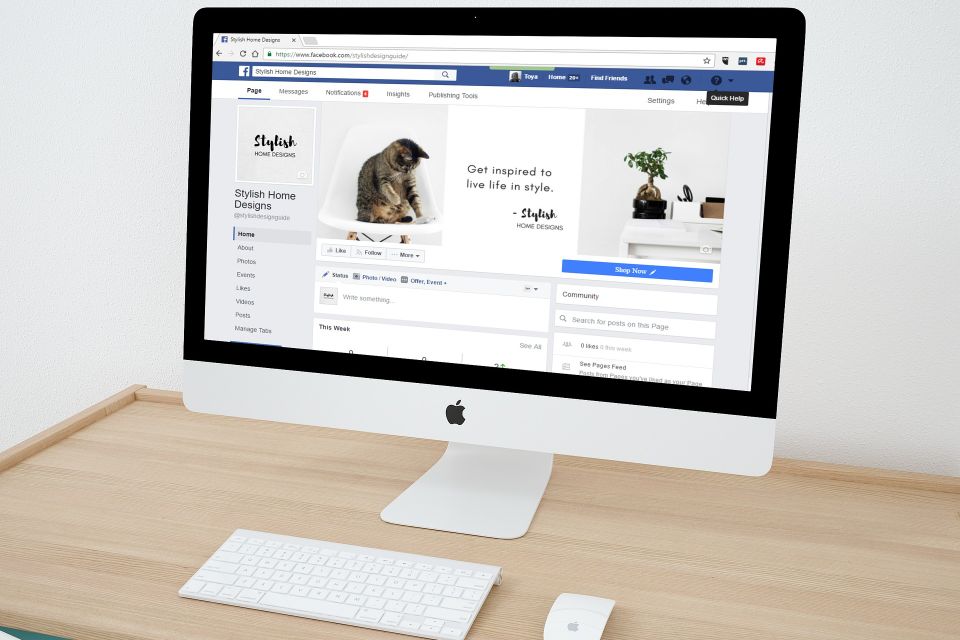Why a Facebook Page is Not a Substitute for a Website
When it comes to promoting and representing your small business online, having a strong, professional digital presence is essential. While many businesses use social media platforms like Facebook to build visibility, relying solely on a Facebook Page as your main online presence can be a costly mistake. 1. You don't own it.One of the biggest drawbacks to using a Facebook page as your business website is that you don't truly own it. The page is controlled by Facebook, they can alter its features, remove it entirely, or limit its visibility in search results at any time. This lack of ownership and control can be frustrating - even harmful - especially if you've invested significant time and resources into building your Facebook presence.2. You eliminate non-Facebook users.While Facebook has over two billion users, many people - especially among younger and older age groups, who still don't use the platform. Relying solely on a Facebook page for your online presence means missing out on these potential customers. Not everyone uses social media, so it's crucial to consider all potential channels for reaching your audience.3. SEO options are limited.SEO, or search engine optimization, is the process of enhancing a website's visibility in search engine results. While you can optimize a Facebook page to an extent, your control over keyword targeting and content strategy is limited. Additionally, a Facebook page typically appears in search results only once, while a well-structured website with multiple pages has the potential to show up multiple times. This significantly improves your chances of being discovered by potential customers online.4. You may have to pay for ads to get seen.Facebook is in the business of making money, and it uses a "freemium" model to do it. While creating a Facebook page and sharing content is free, the reach of those posts is often very limited. To get your posts seen by a larger audience, you may have to pay for ads. While the cost may be manageable for some businesses, it's important to factor it as part of your overall digital marketing budget.5. Functionality is limited.A Facebook page lets you share updates, upload photos, and communicate with customers through Facebook messenger. However, its features are limited compared to a website. A professional website offers great flexibility - enabling you to add contact forms, integrate e-commerce functionality, and build custom pages or blog posts with advanced formatting and design options.6. There's no sales funnel.A sales funnel is a series of steps that a potential customer goes through before making a purchase. On a website, you can implement calls-to-action, landing pages, and conversion-focused elements to guide users through the buying process. In contrast, a Facebook page offers limited control, making it much harder to lead visitors effectively toward a sale.7. Content is limited.While it's possible to write an "About Us" section and post updates on a Facebook page, there isn't really a place to post in-depth content that boosts search engine ranking. A website, on the other hand, allows you to create blog posts, articles, and other valuable content that improves SEO, attracts organic traffic, and helps you engage and retain customers over time.8. You can't brand the page.With a Facebook page, you can upload a profile picture and add a cover image, but your ability to customize your branding stops there. A website, on the other hand, gives you complete creative control - allowing you to choose your color scheme, fonts, and design elements to create a consistent, cohesive, and professional brand identity that stands out online.9. Searching for content is difficult.A website allows you to save, organize, and make pages and posts easily searchable, making it simple for both you and your visitors to locate and revisit older content. While a Facebook page offers limited content organization. This lack of structure makes it harder for users to find valuable information over time.10. Analytics and data are lacking.Finally, the analytics and data available on a Facebook page are far less comprehensive than those available on a website. While Facebook offers basic insights into post reach and engagement, it's not as detailed or customizable as the analytics you can get from a website. This makes it harder to track the effectiveness of your marketing efforts and make data-driven decisions about your business.A Facebook business page should be used in addition to a website, not as a substitute for one.If you want to grow your business online, having a professional website alongside a Facebook page is essential. A website allows you to promote your brand, fully showcase your products or services, create a high-converting sales funnel, and track your marketing efforts through detailed analytics. While it may seem easier and cheaper to use a Facebook page as your primary online presence, its limitations make it an unreliable choice in the long run.
That's where our web design company comes in! We specialize in creating affordable, professional websites for businesses of all sizes. Our team of experienced designers and developers will work with you to create a website that perfectly reflects your brand and meets your business goals. Once your website is up and running, you can use your Facebook page to promote it and drive traffic to your site.
Don't settle for a limited online presence. Invest in a professional website and take your business to the next level. Contact us today to learn more about how we can help your business succeed online.


